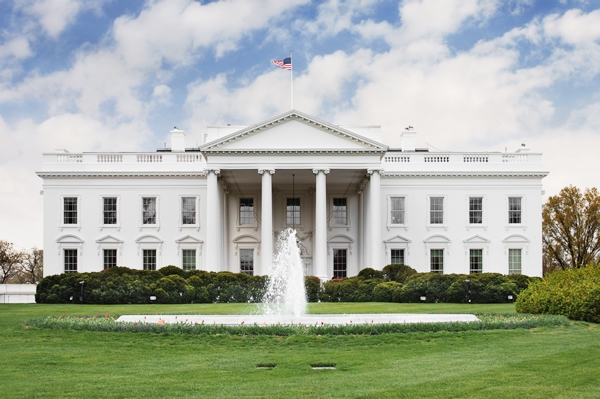National
White House reiterates concern for LGBTQ Ukrainians after Russia invasion
Administration has ‘engaged directly’ with vulnerable groups

A Biden administration official on Friday said the U.S. has “engaged directly” with LGBTQ Ukrainians and other groups that Russia may target if it gains control of their country.
“We have engaged directly with these populations to direct them to programs that offer emergency assistance to address relocation, medical expenses or other unexpected costs,” the official told the Washington Blade. “And we have engaged with allies and partners to try to ensure that those who must flee Ukraine have somewhere to go.”
The official noted that “based on Russia’s past behavior, it is reasonable to expect that Russia’s authorities would target those who oppose or are perceived to oppose the Russian government’s actions or policies, and/or belong to groups of persons targeted for repression inside Russia. The aforementioned would include leading Ukrainian officials, Russian and Belarusian dissidents in exile in Ukraine, independent journalists, anti-corruption activists, vulnerable populations such as members of some religious and ethnic groups, and LGBTQI+ persons.”
“We are also concerned about the safety of persons with disabilities in any conflict situation,” said the official.
“We have warned and will continue to warn groups in the categories we think could be targeted based on our understanding of Russia’s past behavior and our knowledge of Russia’s plans in order to enable them to protect themselves or move to places where they might be safer,” added the official. “We’ve been warning the Ukrainian government of all that may be coming, as well.”
The official spoke with the Blade less than two days after Russia’s invasion of Ukraine began.
The U.S. earlier this week in a letter to U.N. High Commissioner for Human Rights Michelle Bachelet said Russia plans to target LGBTQ Ukrainians and other vulnerable groups the Biden administration official noted to the Blade. A Russian government spokesperson on Tuesday described the claim to the Blade as “propaganda.”
The Congressional LGBTQ+ Equality and Ukraine Caucuses in a letter they sent to Secretary of State Antony Blinken on Tuesday said they are “particularly concerned for the well-being of lesbian, gay, bisexual, transgender and queer (LGBTQ) Ukrainians and other marginalized groups in Ukraine.”
“There is an impending humanitarian emergency in Ukraine and Ukraine’s partners — including the U.S. — must take action to protect Ukrainian lives, with a particular focus on minority communities,” reads the letter. “LGBTQ Ukrainians as well as Ukrainians with disabilities, the elderly, and other marginalized groups face greater hurdles in seeking safety as a Russian incursion into Ukraine begins.”
“We must safeguard the rights of marginalized people in Ukraine and ensure they are protected as this crisis unfolds,” it adds.
The letter notes Ukraine in recent years “has made great strides towards securing equality for LGBTQ people within its borders and is a regional leader in LGBTQ rights.” These advances include a ban on workplace discrimination based on sexual orientation and gender identity and efforts to protect Pride parades.
Ukrainian President Volodymyr Zelenskyy last November pledged his country would continue to fight anti-LGBTQ discrimination after he met with President Biden at the White House.
“LGBTQ civil society in Ukraine is robust and visible with numerous LGBTQ groups officially registered as non-governmental entities,” reads the letter to Blinken. “While there is still work to do, these advancements stand in stark contrast to Russia’s positions on LGBTQ equality. Increased Russian government influence on the lives of Ukrainians is likely to be incredibly harmful to the rights of LGBTQ people in Ukraine.”
The State Department has not responded to the Blade’s request for comment on the letter.
LGBTQ Victory Institute President Annise Parker on Thursday echoed calls for the U.S. to protect LGBTQ Ukrainian activists and other vulnerable groups.
“We call on the United States and our allies to ensure the unique vulnerabilities of Ukrainian LGBTQ leaders and civil society are part of all diplomatic talks and negotiations. Their safety must be paramount,” said Parker in a statement. “The future of Ukrainian democracy depends on it.”
The Global Equality Caucus, a group of LGBTQ elected officials from around the world that fights discrimination based on sexual orientation and gender identity, share Parker’s concerns.
“We are concerned that Russia’s subversion of Ukrainian democracy and sovereignty has put human rights defenders in the country at immediate risk,” said the group on Friday in a statement. “We call on governments worldwide to recognize the humanitarian impact of this invasion and to take necessary action to ensure any Ukrainian at risk of persecution can be guaranteed safety elsewhere.”
A Wider Bridge and more than a dozen other LGBTQ Jewish organizations in the U.S. and around the world on Friday condemned Russia’s invasion of Ukraine and expressed their “solidarity with the people of Ukraine.” The groups, along with the Global Equality Caucus and the Victory Institute, are also concerned for LGBTQ Ukrainians and other groups, including Jewish Ukrainians, inside Ukraine.
“The Ukrainian Jewish and LGBTQ communities face particularly acute vulnerabilities,” reads the groups’ statement. “They have historically been marginalized and continue to face ongoing discrimination. We are deeply concerned that LGBTQ people overall and LGBTQ Jews, in particular, will be subject to scapegoating in what may become a vast humanitarian crisis.”
Michigan
Mich. Democrats spar over LGBTQ-inclusive hate crimes law
Lawmakers disagree on just what kind of statute to pass

Michigan could soon become the latest state to pass an LGBTQ-inclusive hate crime law, but the state’s Democratic lawmakers disagree on just what kind of law they should pass.
Currently, Michigan’s Ethnic Intimidation Act only offers limited protections to victims of crime motivated by their “race, color, religion, gender, or national origin.” Bills proposed by Democratic lawmakers expand the list to include “actual or perceived race, color, religion, gender, sexual orientation, gender identity or expression, ethnicity, physical or mental disability, age, national origin, or association or affiliation with any such individuals.”
Democratic Gov. Gretchen Whitmer and Attorney General Dana Nessel have both advocated for a hate crime law, but house and senate Democrats have each passed different hate crimes packages, and Nessel has blasted both as being too weak.
Under the house proposal that passed last year (House Bill 4474), a first offense would be punishable with a $2,000 fine, up to two years in prison, or both. Penalties double for a second offense, and if a gun or other dangerous weapons is involved, the maximum penalty is six years in prison and a fine of $7,500.
But that proposal stalled when it reached the senate, after far-right news outlets and Fox News reported misinformation that the bill only protected LGBTQ people and would make misgendering a trans person a crime. State Rep. Noah Arbit, the bill’s sponsor, was also made the subject of a recall effort, which ultimately failed.
Arbit submitted a new version of the bill (House Bill 5288) that added sections clarifying that misgendering a person, “intentionally or unintentionally” is not a hate crime, although the latest version (House Bill 5400) of the bill omits this language.
That bill has since stalled in a house committee, in part because the Democrats lost their house majority last November, when two Democratic representatives resigned after being elected mayors. The Democrats regained their house majority last night by winning two special elections.
Meanwhile, the senate passed a different package of hate crime bills sponsored by state Sen. Sylvia Santana (Senate Bill 600) in March that includes much lighter sentences, as well as a clause ensuring that misgendering a person is not a hate crime.
Under the senate bill, if the first offense is only a threat, it would be a misdemeanor punishable by one year in prison and up to $1,000 fine. A subsequent offense or first violent hate crime, including stalking, would be a felony that attracts double the punishment.
Multiple calls and emails from the Washington Blade to both Arbit and Santana requesting comment on the bills for this story went unanswered.
The attorney general’s office sent a statement to the Blade supporting stronger hate crime legislation.
“As a career prosecutor, [Nessel] has seen firsthand how the state’s weak Ethnic Intimidation Act (not updated since the late 1980’s) does not allow for meaningful law enforcement and court intervention before threats become violent and deadly, nor does it consider significant bases for bias. It is our hope that the legislature will pass robust, much-needed updates to this statute,” the statement says.
But Nessel, who has herself been the victim of racially motivated threats, has also blasted all of the bills presented by Democrats as not going far enough.
“Two years is nothing … Why not just give them a parking ticket?” Nessel told Bridge Michigan.
Nessel blames a bizarre alliance far-right and far-left forces that have doomed tougher laws.
“You have this confluence of forces on the far right … this insistence that the First Amendment protects this language, or that the Second Amendment protects the ability to possess firearms under almost any and all circumstances,” Nessel said. “But then you also have the far left that argues basically no one should go to jail or prison for any offense ever.”
The legislature did manage to pass an “institutional desecration” law last year that penalizes hate-motivated vandalism to churches, schools, museums, and community centers, and is LGBTQ-inclusive.
According to data from the U.S. Department of Justice, reported hate crime incidents have been skyrocketing, with attacks motivated by sexual orientation surging by 70 percent from 2020 to 2022, the last year for which data is available.
Twenty-two states, D.C., Puerto Rico, and the U.S. Virgin Islands have passed LGBTQ-inclusive hate crime laws. Another 11 states have hate crime laws that include protections for “sexual orientation” but not “gender identity.”
Michigan Democrats have advanced several key LGBTQ rights priorities since they took unified control of the legislature in 2023. A long-stalled comprehensive anti-discrimination law was passed last year, as did a conversion therapy ban. Last month the legislature updated family law to make surrogacy easier for all couples, including same-sex couples.
A bill to ban the “gay panic” defense has passed the state house and was due for a Senate committee hearing on Wednesday.
Indiana
Drag queen announces run for mayor of Ind. city
Branden Blaettne seeking Fort Wayne’s top office

In a Facebook post Tuesday, a local drag personality announced he was running for the office of mayor once held by the late Fort Wayne Mayor Tom Henry, who died last month just a few months into his fifth term.
Henry was recently diagnosed with late-stage stomach cancer and experienced an emergency that landed him in hospice care. He died shortly after.
WPTA, a local television station, reported that Fort Wayne resident Branden Blaettne, whose drag name is Della Licious, confirmed he filed paperwork to be one of the candidates seeking to finish out the fifth term of the late mayor.
Blaettner, who is a community organizer, told WPTA he doesn’t want to “get Fort Wayne back on track,” but rather keep the momentum started by Henry going while giving a platform to the disenfranchised groups in the community. Blaettner said he doesn’t think his local fame as a drag queen will hold him back.
“It’s easy to have a platform when you wear platform heels,” Blaettner told WPTA. “The status quo has left a lot of people out in the cold — both figuratively and literally,” Blaettner added.

The Indiana Capital Chronicle reported that state Rep. Phil GiaQuinta, who has led the Indiana House Democratic caucus since 2018, has added his name to a growing list of Fort Wayne politicos who want to be the city’s next mayor. A caucus of precinct committee persons will choose the new mayor.
According to the Fort Wayne Journal Gazette, the deadline for residents to file candidacy was 10:30 a.m. on Wednesday. A town hall with the candidates is scheduled for 6 p.m. on Thursday at Franklin School Park. The caucus is set for 10:30 a.m. on April 20 at the Lincoln Financial Event Center at Parkview Field.
At least six candidates so far have announced they will run in the caucus. They include Branden Blaettne, GiaQuinta, City Councilwoman Michelle Chambers, City Councilwoman Sharon Tucker, former city- and county-council candidate Palermo Galindo, and 2023 Democratic primary mayoral candidate Jorge Fernandez.
Arizona
Ariz. governor vetoes anti-transgender, Ten Commandments bill
Katie Hobbs has pledged to reject anti-LGBTQ bills that reach her desk

BY CAITLIN SIEVERS | A slew of Republican bills, including those that would have allowed discrimination against transgender people and would have given public school teachers a green light to post the Ten Commandments in their classrooms, were vetoed by Gov. Katie Hobbs on Tuesday.
Hobbs, who has made it clear that she’ll use her veto power on any bills that don’t have bipartisan support — and especially ones that discriminate against the LGBTQ community — vetoed 13 bills, bringing her count for this year to 42.
Republicans responded with obvious outrage to Hobbs’s veto of their “Arizona Women’s Bill of Rights,” which would have eliminated any mention of gender in state law, replacing it with a strict and inflexible definition of biological sex. The bill would have called for the separation of sports teams, locker rooms, bathrooms, and even domestic violence shelters and sexual assault crisis centers by biological sex, not gender identity, green-lighting discrimination against trans Arizonans.
“As I have said time and again, I will not sign legislation that attacks Arizonans,” Hobbs wrote in a brief letter explaining why she vetoed Senate Bill 1628.
The Arizona Senate Republicans’ response to the veto was filled with discriminatory language about trans people and accused them of merely pretending to be a gender different than they were assigned at birth.
“With the radical Left attempting to force upon society the notion that science doesn’t matter, and biological males can be considered females if they ‘feel’ like they are, Katie Hobbs and Democrats at the Arizona State Legislature are showing their irresponsible disregard for the safety and well-being of women and girls in our state by killing the Arizona Women’s Bill of Rights,” Senate Republicans wrote in a statement.
The Senate Republicans went on to accuse the Democrats who voted against the bill of endangering women.
“Instead of helping these confused boys and men, Democrats are only fueling the dysfunction by pretending biological sex doesn’t matter,” Senate President Warren Petersen said in the statement. “Our daughters, granddaughters, nieces, and neighbors are growing up in a dangerous time where they are living with an increased risk of being victimized in public bathrooms, showers, and locker rooms because Democrats are now welcoming biological males into what used to be traditionally safe, single-sex spaces.”
But trans advocates say, and at least one study has found, that there’s no evidence allowing trans people to use the bathroom that aligns with their identity makes those spaces less safe for everyone else who uses them.
In the statement, the bill’s sponsor, Sen. Sine Kerr (R-Buckeye), claimed that the bill would have stopped trans girls from competing in girls sports, something she said gives them an unfair advantage. But Republicans already passed a law to do just that in 2022, when Republican Gov. Doug Ducey was still in office, though that law is not currently being enforced amidst a court challenge filed by two trans athletes.
Republicans also clapped back at Hobbs’ veto of Senate Bill 1151, which would have allowed teachers or administrators to teach or post the Ten Commandments in public school classrooms, a measure that some Republicans even questioned as possibly unconstitutional.
In a statement, the bill’s sponsor, Sen. Anthony Kern (R-Glendale), accused Hobbs of “abandoning God” with her veto.
“As society increasingly strays away from God and the moral principles our nation was founded upon, Katie Hobbs is contributing to the cultural degradation within Arizona by vetoing legislation today that would have allowed public schools to include the Ten Commandments in classrooms,” Kern said in the statement.
In her veto letter, Hobbs said she questioned the constitutionality of the bill, and also called it unnecessary. During discussion of the bill in March, several critics pointed out that posting the Ten Commandments in public school classrooms, tenets of Judeo-Christian religions, might make children whose families practice other religions feel uncomfortable.
“Sadly, Katie Hobbs’ veto is a prime example of Democrats’ efforts to push state-sponsored atheism while robbing Arizona’s children of the opportunity to flourish with a healthy moral compass,” Kern said.
Another Republican proposal on Hobbs’s veto list was Senate Bill 1097, which would have made school board candidates declare a party affiliation. School board races in Arizona are currently nonpartisan.
“This bill will further the politicization and polarization of Arizona’s school district governing boards whose focus should remain on making the best decisions for students,” Hobbs wrote in her veto letter. “Partisan politics do not belong in Arizona’s schools.”
******************************************************************************************

Caitlin joined the Arizona Mirror in 2022 with almost 10 years of experience as a reporter and editor, holding local government leaders accountable from newsrooms across the West and Midwest. She’s won statewide awards in Nebraska, Indiana and Wisconsin for reporting, photography and commentary.
******************************************************************************************
The preceding piece was previously published by the Arizona Mirror and is republished with permission.
Amplifying the voices of Arizonans whose stories are unheard; shining a light on the relationships between people, power and policy; and holding public officials to account.
Arizona Mirror is part of States Newsroom, the nation’s largest state-focused nonprofit news organization.
-

 Africa4 days ago
Africa4 days agoCongolese lawmaker introduces anti-homosexuality bill
-

 District of Columbia15 hours ago
District of Columbia15 hours agoReenactment of first gay rights picket at White House draws interest of tourists
-

 World4 days ago
World4 days agoOut in the World: LGBTQ news from Europe and Asia
-

 Arizona20 hours ago
Arizona20 hours agoAriz. governor vetoes anti-transgender, Ten Commandments bill













